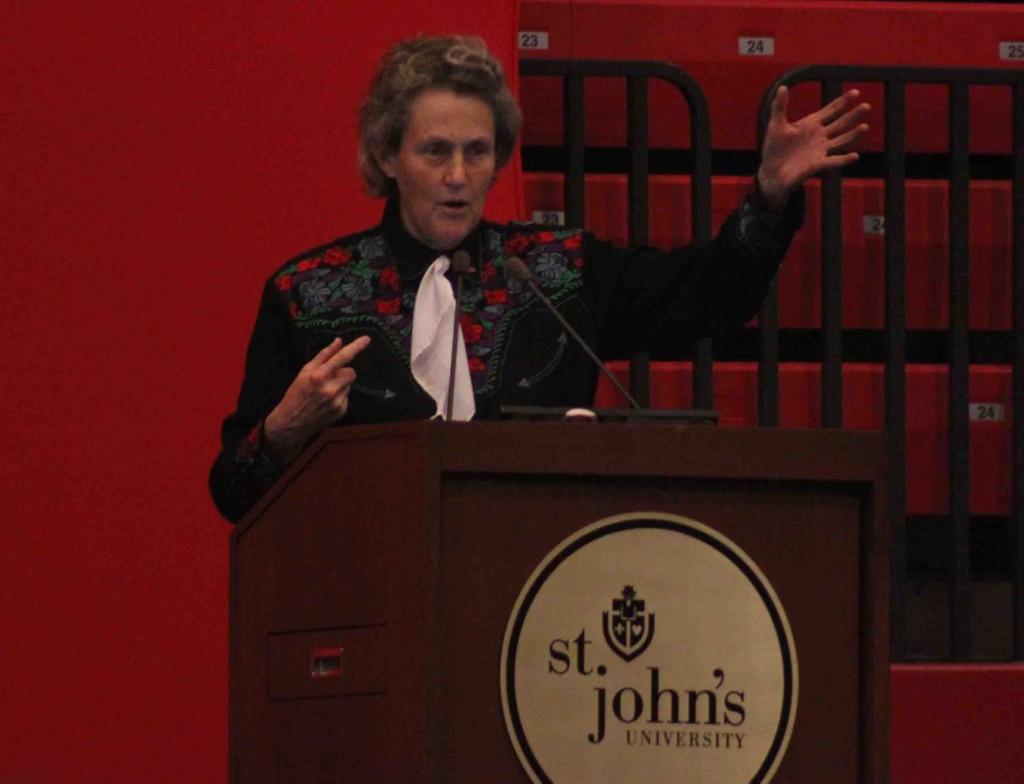TORCH: What accomplishment are you most proud of?
Dr. Temple Grandin: I have things I’m most proud of from an animal standpoint. One of the things that have made the most difference in animal welfare was a scoring system I developed that measured how many cattle vocalized when you were handling them. Because that perhaps is a measurement of things aren’t working right. I’ve also had a lot of equipment I have designed. I designed the center track design system that’s in all the large meat packing plants. Yeah you want to have right equipment, but you need the right management to go with it because of you don’t manage it, it doesn’t work. You got kids now who think iPads are the magic solution for kids who have autism. iPads are a great tool but they are not a magic solution. It cannot replace good teaching. People so often want a magic bullet to be able to fix things. Good equipment makes everything possible but you have to have trained employees and supervision to go with it.
T: What projects are you looking to start or have done recently?
G: I just finished an interesting project on mother cows and individual differences in how it protects their calf. Some of them call their baby, others don’t. It’s a project a student and I just finished. Now, we are working on measurements of cow handling in feed yards. We found out that cattle that bellow when you handle them have lower weight gain.
T: In some of your interviews and your TED lecture, you mention pigs and chickens are a subject of animal cruelty.
G: There are still problems in how they are housed. You can be a vegan but I enjoy eating meat. We have to find practical solutions for problems. I believe there are things that have to be improved. The thing that worries me about policy stuff. We’re getting people into office that haven’t worked hands-on in nothing. The one thing I like about Pope Francis is that he is an ordinary guy who wears sensible shoes. He doesn’t mind being photographed. He ditched all the security crap because this guy is hands on working with the poor. We need a lot more people in positions of authority with that kind of a background. One of the problems today is that so many things have turned into ideology.Whatever you’re advocating about, you have to actually find out what’s going on.
T: Can you talk about a particular experience with your high school teacher, Mr. Carlock that motivated your interest in science?
G: The thing he did, he had really interesting projects for me to work on. Individual perception. That’s one I really like. He also introduced me to science literature. You have to remember there was no way of looking up for these things on Google Scholars. I had to learn that real scientists didn’t use the Encyclopedia Britannica. I didn’t even know what a scientific journal was in high school. He introduced me to the world of scientific papers. He took me to a library in Boston and saw psychological abstracts. We looked at papers. We didn’t even have a copy machine. We read their abstracts and put it on our index cards. Then like four years later we got the copy machine and that was the best thing ever. There was this whole world of scientific literature he showed me how to research and learn from.
T: Here at St. John’s besides efforts towards cancer research, we’re pretty big on autism research. What can you say to all the students, parents and faculty who have someone who’s affected by autism?
G: I’m going to be age specific. You have a 3-year-old who’s not talking. I don’t care what the label is. The worst thing you can do is nothing. You gotta start working with that kid. If you can’t get workers, you get grandmothers and students working with that kid. Teach him games, teach him nursery rhymes but interact with him. Don’t let him sit in the corner rocking on his chair. That’s the worst thing you can do. I went to a little speech therapy class in a basement of a house, then my mother hired a nanny who did a lot of emphasis on turn-taking games. Teach them how to wait and how to inhibit a response.
T: What was your favorite game?
G: My favorite game as a young kid was the hockey game where you have to slide the mallet. That was my favorite game. Too many activities today are solitary. I couldn’t play table hockey by myself, I needed someone else to play. We played lots of board games where you have to wait your turn and don’t cheat. I remember when I used to play parachis and I slid a couple sixes in the cup and slid them out. I must admit that was cheating and that was not all right. You have to give it a fair shake. There a lot that can be taught by board games.
T: What’s your favorite type of meat?
G: I couldn’t be a vegan if I wanted to be. I like beef. Good beef.














